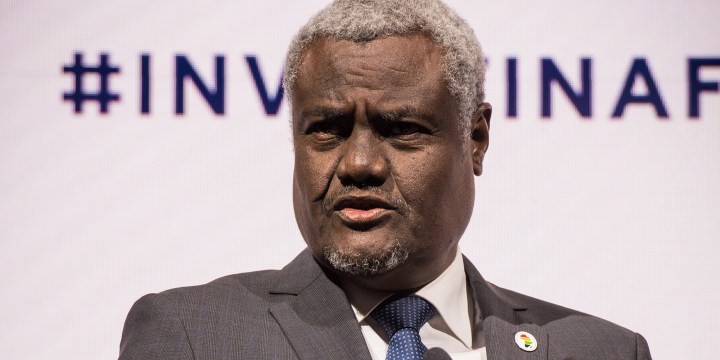ISS TODAY ANALYSIS young representation
AU chair to finally appoint new Youth Envoy following almost year-long vacuum

Leaving the post vacant has cast doubts on the AU’s commitment to the majority of Africa’s people.
When the post of Youth Envoy for the African Union (AU) chairperson was created in 2018, the message to young people and governments across the continent was clear — youth interests and their leadership matter to the AU, and countries should take note and follow suit.
Africa is, after all, the world’s youngest continent with a median age of 20 compared to the global figure of 31 years. According to Pew Research Center, all but one of the 20 countries with the lowest median ages are in Africa (Afghanistan is the exception).
But despite the potential of this position for Africa, the post has been vacant since February when the first Youth Envoy Aya Chebbi’s two-year term ended. AU Chairperson Moussa Faki Mahamat is due to announce the new envoy on 1 November, Africa’s Youth Day.
The hiatus could have resulted from poor coordination between Faki’s office and the Youth Division as staff adjusted to structural changes brought on by AU institutional reforms. Nonetheless, the delay casts doubt on Faki’s commitment to youth empowerment and threatens the progress over the past three years in mainstreaming youth issues in the AU Commission.
Chebbi’s time in office coincided with Faki’s tenure as AU chairperson. He was re-elected at the 34th AU summit in February and could have extended Chebbi’s term. By not doing so and failing to appoint a successor, the envoy’s office and staff — short-term volunteers from the AU’s Youth Volunteer Corps — were essentially dissolved. This was a blow for youth leadership, especially considering that the African Youth Charter calls for the regular replacement of leaders to encourage inclusion and participation.
The AU Commission’s handling of the Youth Envoy matter raises two institutional red flags. First, it neglected a vital leadership position on a continent populated mainly by young people. Africa’s youth are a minority among national, regional and continental leaders, which creates a generational disconnect with those in positions of power. As long as this endures and the socio-economic aspirations of millions of young people remain unaddressed, the AU is unlikely to achieve a peaceful and prosperous continent.
And the AU Commission wasn’t short of options to replace Chebbi. Several promising candidates from within its own ranks could have been considered. These include five African Youth Ambassadors for Peace, six Saleema Youth Victorious Ambassadors and five Anti-Corruption Youth Ambassadors. A succession plan could have ensured that a new envoy or an interim representative took up the position during the February AU summit.
Second, the hiatus seems to have diminished the relevance of the Youth Envoy’s office despite its commendable legacy. Its track record includes providing a bridge between the AU chairperson and the Youth Division. Chebbi also built ties with other AU Commission programmes and AU organs, and improved young people’s access to her office. Without a leader in the AU, all the continental body’s outreach activities involving youth are compromised.
To re-establish the office, the incoming envoy will, like Chebbi, have to spend a significant part of their term on fundraising and staffing. Three specific priorities for the new leader are financing, diversity and accessibility.
Financing was a significant challenge for Chebbi and one that the AU has only partially addressed. Whereas she was remunerated via honorariums, the incoming envoy will receive a salary and likely be based in Addis Ababa. The first envoy moved to AU headquarters almost a year into her term due to a lack of office infrastructure. Her nine-member advisory council worked remotely from the AU’s six regions. Paying the envoy’s salary is crucial, but funds are still lacking for youth-related initiatives.
Diversifying the team working with the envoy is also essential in terms of their geographic and thematic expertise. To collaborate effectively with the AU’s various programmes, skills are needed in agriculture, peace processes, climate change and security, among others. The envoy also needs to engage with the African youth in the diaspora.
Concerning accessibility, the incoming envoy needs to be visible and interact with youth in countries across the continent. A limited travel budget and Covid-19 restrictions meant Chebbi could make only two trips during her term, to Namibia and South Sudan. Online interactions are beneficial but reach only those youth with the access and resources for digital connections.
The AU is responsible for enabling contact between the new envoy and its commission, regional economic communities and member states. For the incoming envoy, the task is to rebuild the momentum lost since February and tackle grave challenges on behalf of Africa’s youth, such as unemployment, violent extremism and the difficulties caused by Covid-19.
Perhaps the new appointee’s hardest task though will be convincing the AU Commission and member states to capacitate the Office of the Youth Envoy as a demonstration of support for sustained continental youth leadership. DM
Muneinazvo Kujeke, Research Officer, Peace Operations and Peacebuilding, ISS Pretoria.
This ISS Today is published as part of the Training for Peace Programme (TfP) funded by the government of Norway.
First published by ISS Today



















Comments - Please login in order to comment.